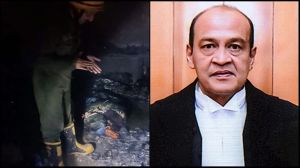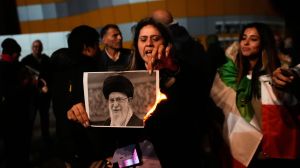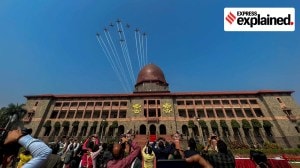Delaying devolution till it derails
Nov 19: As President Chandrika Kumaratunga prepares the ground to implement her proposals to share power with the minority Tamil community ...

Nov 19: As President Chandrika Kumaratunga prepares the ground to implement her proposals to share power with the minority Tamil community of Sri Lanka, it is evident that the United National Party UNP has decided to play the traditional role of successive Opposition parties in this country 8212; prevent the party in power from resolving the ethnic conflict. However, this time, the Opposition, despite strident Sinhalese rhetoric from some of its members, seems to have decided that it will not resort to the crude methods adopted by its predecessors to scuttle a political solution framed by the ruling party to meet Tamil aspirations.
Instead of taking to the streets demanding that the proposals be banned, UNP leader Ranil Wickremesinghe, has resorted to a tactic that, if it works, may yield quite the same result.
Underlying the UNP8217;s reservations8217; about the present proposals and various enigmatic pronouncements by Wickremesinghe, first about the virtues of the 1987 Indo-Sri Lanka inspired 13th Amendment, then about asymmetric need-based devolution on the pattern of Scotland and Wales, there seems to be a clear strategy to delay the process initiated by Kumaratunga to such an extent that it will ultimately derail.
The UNP strategy is driven by two factors: one, Kumaratunga must not get all the kudos for resolving Sri Lanka8217;s bitter and violent 14-year-old ethnic conflict; and two, in the changed political reality in the country, in which both main parties 8212; the UNP and the SLFP 8212; are heavily dependent on minority vote-banks, blind opposition to proposals that seek to address minority grievances can only be self-defeating for the UNP in the next election.
Also influencing the UNP8217;s calculations to some extent is the support that Kumaratunga has gained from the international community for her efforts at resolving the conflict.
8220;The UNP cannot be seen as blocking a solution. But they also fear that the entire credit for putting in place a solution will be clinched by the Government. So they have decided to do all they can to delay the process,8221; said member of Parliament Rauff Hakeem of the Sri Lanka Muslim Congress, which is a coalition partner in Kumaratunga8217;s Government.
In all this, however, the UNP8217;s thrust has been to appear reasonable and moderate, ever-willing to negotiate and discuss. When the Government presented its draft proposals to Parliament, attached to it was a 8220;rider8221; submitted by UNP representatives on the select committee that debated the proposals. The rider listed the objections to the Government proposals on devolution, but also emphatically stated that the UNP was committed to devolution.
So far, that is the only silver lining because for the first time, both ruling and Opposition parties have stated that the only way to resolve the conflict is by devolving power to the Tamils. But that does not mean that the UNP wants Kumaratunga8217;s Government to be the one to do it.
And at the top of the UNP8217;s agenda is to buy time in order to stall the process. At the last meeting of the UNP8217;s working committee, Wickremesinghe appointed two sub-committees to 8220;study8221; the devolution proposals.
The task of these sub-committees is to come up with 8220;alternative8221; devolution proposals and it is the UNP8217;s demand that these suggestions should be incorporated in the final constitution.
For all this the party believes that the Government should allow for six months.
Party sources said that the UNP leadership believes that within that time, the Government offensive against the LTTE in the north will reach a total stalemate, preventing Kumaratunga from claiming military success against the Tigers. And it might force the Government to reinitiate talks with the LTTE, something that Wickremesinghe has been demanding, on the ostensible ground that no political solution will be viable without participation of the Tigers.
But as most Sri Lankans know by now, talks with the LTTE have always proved to be quagmires in which several governments have floundered.
Said Hakeem, 8220;By wishing the Tigers back into the scene, the UNP is actually hoping that the situation will become so intractable that it will ultimately end in failure for the Government.8221;
However, unlike on three previous occasions in the history of independent Sri Lanka when the Government allowed itself to be led by the Opposition on the ethnic question, what may upset the calculations of the Opposition party this time is that the ruling party is prepared to call its bluff.
In order to implement the proposals, the Government needs two-thirds support for them, followed by a referendum. With a majority of one in the House, the ruling coalition has to necessarily depend on the UNP for this support, unless it decides to have the referendum directly, without going for a vote by parliamentarians.
Justice and Constitutional Affairs Minister G.L. Peiris has said repeatedly that the Government is not prepared to wait indefinitely to implement the new constitution, of which the devolution proposals are the centrepiece.
8220;The Government will begin implementation of the constitutional reforms early in the next year. The time is coming for action rather than for more and more talk. If we feel in the early months of next year that insufficient progress is being made, then we will have to consider other democratic methods to implement the reforms,8221; he said recently.
If support from the UNP does not seem forthcoming, it is believed that early next year, the Government may hold a nation-wide referendum on the proposals and on the basis of results 8212; no one has any doubt it will favour Kumaratunga 8212; demand support from the UNP or simply go ahead and change the constitution without asking Parliament.
Party members are already jittery about the consequences of such a referendum for the UNP. In the eventuality that it is held, Wickremesinghe may well have to bow to the wishes of the more strident elements in his party.
- 01
- 02
- 03
- 04
- 05































